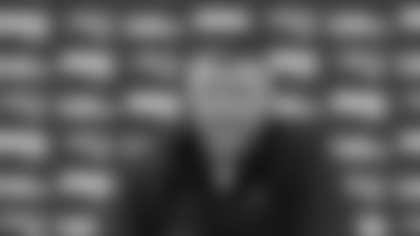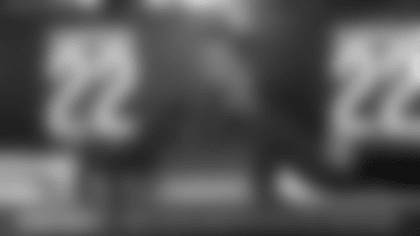Patriots rookies visit the Pro Football Hall of Fame in Canton, Ohio.

The education of its rookies is a multi-platform task, the NFL has learned. It is an enduring process that kicks off at the pee-wee level on through college careers and increases steam at the annual scouting combine.
The April draft marks the players who are favorites to make NFL clubs. The league's rookie symposium follows a couple of months later.
This year's four-day version was completed last week in Carlsbad, Calif. Through skits, question-and-answer sessions, videos, expert motivational speakers, testimonies from NFL players present and past, financial advice and sex education, drug and gun awareness, the group was reminded that they are joining a fraternity, that their standard of off-field excellence and conduct must be elevated and that varied league and team resources are available to help them achieve those goals.
Learning from the past
Focus on the league's history -- knowing it, appreciating it, applying it -- increasingly colors nearly every aspect of the league's outreach.
"You don't have a choice but to embrace it all," said Tennessee Titans rookie cornerback Cary Williams. "Commissioner Roger Goodell is not playing. You don't want to be in his sights for the wrong reasons. You don't want to be that guy."
Goodell has made player development and conduct a central theme in his league blueprint and he is supporting it with these kinds of programs to give rookies solid chances for clean, effective career starts and beyond. For the league's continued health, Goodell knows the stakes are high. And that discipline alone is not the solution.
Thus, the seeds must be planted.
And watered.
"Many of these players do not realize the depth and breadth of our history and what has been established," said Ray Anderson, the NFL's executive vice president of operations. "Many of them through this process have been totally enlightened. And the ones that do not get it will find there is no place for them. We know that there are those that will not elevate."
"You don't have a choice but to embrace it all."
– Cary Williams, Titans cornerback
It was evident even at the symposium.
Two teammates reportedly argued and fought during a symposium session. The fact that two players at the symposium would let such a beef publicly unfold in an exercise that encourages player restraint and responsibility provides a window into the minds of some of today's young NFL players.
"I had a maturity issue as well," said defensive end Jared Allen, formerly a Kansas City Chief, now a Minnesota Viking, who was part of a symposium panel discussion on history and conduct. "Whether you are a seventh-rounder or an instant millionaire glamour pick, character tests are coming. And it's hard to know and realize at that age. The majority of these kids are money-driven. They measure their success by money. Changing that culture is hard to do. One of the best ways is by repeatedly reminding them and showing them the league's history. This is the way to show them how football can help create in them better men."
Jerry Rice told the players that working hard and respecting teammates were essential to their success. Cris Carter told them that the draft was simply each player obtaining his "lane assignment" and now they should be about the business of enhancing the league's legacy. Willie Roaf encouraged them to follow in the footprints of past NFL legends and current veterans on their teams.
Their common thread focused on NFL history.
Nearly all of the rookies had already visited the Pro Football Hall of Fame in Canton, Ohio, along with respective club ambassadors. In fact, rookies from 30 NFL clubs visited prior to the symposium. Only Washington and Indianapolis, the teams playing in the Hall of Fame game on Aug. 3, remain. Both will visit during Hall of Fame weekend.
The impetus
The idea originated from Michael Irvin, the Dallas Cowboys' Hall of Fame receiver.
Irvin convinced Goodell that several of today's NFL players come from backgrounds where their past hurts. He told Goodell these players do not embrace history but are running from their own histories of oftentimes broken homes in urban nightmares.
Goodell listened and made rookie visits to the Hall of Fame this summer mandatory. For several clubs, their rookie chaperons were Hall of Fame members. Among them, Gale Sayers led the Chicago Bears. Larry Wilson the Arizona Cardinals. Willie Lanier, Bobby Bell and Len Dawson the Kansas City Chiefs. Jack Youngblood the St. Louis Rams. Steve Largent the Seattle Seahawks. Willie Brown the Oakland Raiders. Joe DeLamielleure the Buffalo Bills. Andre Tippett the New England Patriots.
On June 9, Irvin led the Cowboys contingent.
Irvin said on that day while standing a few feet from his bust: "Well, this is a great feeling. Some guys play this game to erase the hurt. To erase the past. Asking them to remember the past is foreign to them. Every time one of them gets into trouble we say they don't respect the game or know the history. Left alone, they are not history-driven. Many of them will now leave here with a seasoned purpose."
Clearly, some did. Clearly, some did not.
It is fair to ask if one day at the Hall of Fame can make a difference in rookies' careers. It is fair to ask if today's players are less knowledgeable and do not care.
"I have a hard time buying into that," said former NFL star cornerback Troy Vincent, who accompanied the Eagles on their visit that coincided with the Cowboys'. "You can't have this Hall experience without a sense of carrying on tradition. You can't leave here without at least a new glimpse. These young men are learning the heroes of their grandfathers. And that the game is bigger than any one individual -- including each one of them."
"You can't leave without hoping that one day you will get there."
– Keenan Burton, Rams receiver
Pete Fierle, the Hall's information service manager, said that when the players experienced their guided tours they often focused on inductees who played their positions or those from their franchises. He noticed that the Detroit Lions rookies brought pens and pads to take notes in preparation for a Hall quiz once they returned to their complex. Fierle noticed that the Seahawks players were especially attentive and professional.
He saw several players' eyes widen when he told them that 13 Hall of Famers were drafted in the 10th round or higher and that 13 more were free agents.
It was another example for them that greatness can be shaped, formed, nurtured, developed.
"That trip was a dose of reality," Rams rookie receiver Kennan Burton said. "You can't leave there as a young player without feeling the impact. You can't leave without hoping that one day you will get there."
History buff
San Diego Chargers rookie running back Jacob Hester said that at LSU he often met with former Green Bay Packer and Hall of Fame back Jim Taylor. Taylor lives near the LSU campus and offered Hester advice on what makes a stellar running back.
During Hester's trip to the Hall, Taylor's bust was among Hester's first stops.
"I'm a big history buff," Hester said. "I got the great chance to meet and get to know Jim Taylor. And then we go to the Hall and I see his bust and it was awesome. So was the section on the African-American pioneers, guys like Marion Motley and Bill Willis. African-American studies was my minor at LSU. I really appreciated that exhibit. And now I'm a Charger, I will be blocking for LT (LaDainian Tomlinson) and there are his cleats in the Hall for some of his outstanding accomplishments. That's incredible that I'm even on the same team.
"No matter who you are or where you come from, that experience is humbling for the first pick all the way to Mr. Irrelevant. Any component of history can help you grow. Even bad things."
"That experience is humbling for the first pick all the way to Mr. Irrelevant."
– Jacob Hester, Chargers running back
The lesson plan
Pittsburgh Steelers rookie running back Rashard Mendenhall said the Hall of Fame experience "let me know what I was joining and what I come from." Duane Brown, a Houston Texans rookie defensive end, said he saw it, and "I bought it, the legacy." New Orleans Saints rookie kicker Taylor Mehlhaff said his Hall visit reminded him that he represents the game, a prestigious league, and that "I must do my part."
Several other rookies said their Hall of Fame visit achieved its goal with a recurring theme: The league, the game, is bigger than you.
Yet, Cris Carter insisted, some players will miss the mark.
"There will be no perfection in appreciation, in growth with these young men no more than there will be in any other industry in society," Carter said. "They are human. They are frail despite their strengths. There are some warped minds, some selfish ones. You try to give them all the best options, the best education of the league.
"But each individual has to run the same race, the same distance. Each one has to make up in his own mind to get in hot pursuit of being great. They eventually get there. Or eventually learn how easily they will be replaced."
Exposure to the league's history matters.
How much is an individual narrative each rookie must write.
Rams offensive guard Roy Schuening provides hope for conversion. For impact.
"Coming into this symposium, going into my Hall of Fame visit, I had a negative feel for it," Schuening said. "Probably like many of the guys here, all I was thinking about was getting home before training camp starts. But this was an enlightening, pleasing experience. Very positive. At the Hall of Fame, I saw all of the old faces. The early games. Great timelines. A lot of it I didn't know about, and I felt I had a good NFL education already."
The 2008 draft class is more informed on the NFL's history lessons than any other.
It is not an ending. Only a beginning.












































